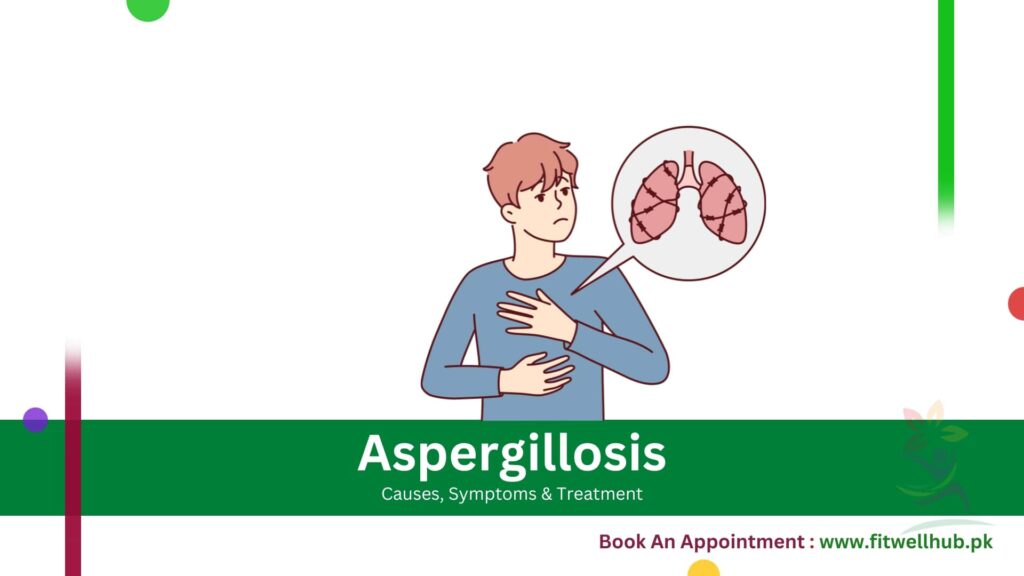Aspergillosis is an infection caused by Aspergillus mold commonly found in the soil, on decaying vegetation, or even indoors. Even though most individuals inhale the spores of Aspergillus daily, the majority do not get sick from it. Individuals with weak immunities or predisposing lung diseases may be more prone to infection. It varies from mild allergy-related reactions to severe, life-threatening illnesses, mainly in the lungs.
Quick Links
ToggleChronic pulmonary aspergillosis (CPA) is a specific type of aspergillosis. It develops slowly over months or years and typically affects individuals with pre-existing lung conditions like tuberculosis or COPD. Progressive lung damage characterizes CPA, along with symptoms like persistent cough and weight loss. In Pakistan, chronic pulmonary aspergillosis (CPA) affects an estimated 39 per 100,000 people, primarily due to the country’s high tuberculosis burden, ranking fifth globally. Reports show that invasive aspergillosis occurs at 5.9 cases per 100,000, and fungal keratitis at 44 cases per 100,000.
Symptoms
Common symptoms of aspergillosis include:
- Coughing (with or without blood): One of the common symptoms among people suffering from aspergillosis is coughing. More serious conditions include blood-tinged sputum due to lung tissue damage.
- Shortness of Breath: This symptom is common because the fungus often affects the lungs, resulting in restricted airflow.
- Fever: A chronic low to high-grade fever may indicate an aspergillus infection, especially in weakened immune system patients.
- Chest Pain: Invasive aspergillosis leads to chest pain. It increases with deep breathing or during a cough as the infection progresses within the lungs.
- Fatigue: Chronic and persistent tiredness and generalized weakness may occur as a result of fighting the fungal infection by the body, especially in immunocompromised individuals.
Our smart hospitals redefine healthcare with innovative technologies, AI integration, and comprehensive patient care facilities. This helps provide faster, personalized care to patients across Pakistan, improving accessibility and treatment outcomes.
GET IN TOUCH
Book An Appointment
When to See a Doctor
You need to see a doctor if you have blood in your cough, chest pain, persistent fever, or difficulty breathing, particularly if you have a compromised immune system or a previous history of lung disease. Early detection and prompt treatment stop the infection from getting worse or from spreading to other areas of the body.
Fitwell Hub provides thorough diagnostic services to identify fungi-related diseases. Book an appointment with us today, and let our experts guide you on your wellness journey!
Causes
The different causes of aspergillosis include:
- Inhalation of Aspergillus Spores: Inhaling Aspergillus spores from the environment causes aspergillosis. Aspergillus mold grows both indoors and outdoors, particularly in soil and rotting plant material.
- Weakened Immune System: A patient with a weakened or compromised immune system has a higher chance of developing. Patients undergoing chemotherapy and organ transplantation and treated with immunosuppressive drugs have low immunity.
- Pre-existing Lung Conditions: People of any age with long-term lung diseases. Such as asthma, cystic fibrosis, or COPD, are more susceptible to Aspergillus infection.
- Environmental Exposure: The risk of exposure to Aspergillus spores increases in construction sites or areas with a lot of dust and mold.
- Medical Procedures: Invasive medical procedures such as surgery or the use of devices like ventilators may incorporate aspergillus into the body, increasing the chances of developing an infection.
Risk Factors
Primary risk factors for developing aspergillosis include:
- Long-Term Steroid Use: Prolonged intake of corticosteroids decreases the immunity of the patient and makes him susceptible to fungal infections such as aspergillosis.
- Chronic Antibiotic Use: Prolonged use of antibiotics disturbs the body’s natural defense system, and the risk of fungal infection, like aspergillosis, increases.
Complications
Aspergillosis may cause several serious complications if left untreated:
- Invasive Aspergillosis: This is one of the most serious forms, in which the infection spreads beyond the lungs to other organs such as the brain, kidneys, and heart, and it can be life-threatening.
- Allergic Bronchopulmonary Aspergillosis (ABPA): In ABPA, an allergic reaction caused by Aspergillus in the lungs causes worsening symptoms of asthma, including wheezing and coughing.
- Lung Cavities: Chronic forms of infection can lead to the formation of cavities in the lungs or make holes in them, sometimes leading to serious bleeding or damage to the lungs.
- Chronic Pulmonary Aspergillosis: Chronic infection with aspergillosis can also lead to long-term damage to the lungs, including ongoing coughing, loss of weight, and breathing difficulties.
- Disseminated Infection: Rarely, the Aspergillus infection can disseminate from the lungs to other parts of the body and cause generalized infections, requiring immediate treatment.
Prevention
Prevent aspergillosis by reducing exposure to Aspergillus spores and strengthening the immune system:
- Avoid Dusty Environments: People with poor immunity or any type of lung disorder should avoid places containing too much dust, soil, or mold because these areas may contain Aspergillus spores.
- Use HEPA Filters: The use of HEPA filters in air conditioning systems or air purifiers will help in trapping the spores, thus reducing the risk of exposure.
- Wear Protective Masks: Wear a mask when you pass through areas where there is a risk of Aspergillus exposure, such as construction sites or places with mold. It will minimize inhalation.
- Strengthen the Immune System: You can reduce the risk of aspergillosis by eating a balanced diet, avoiding long-term steroid use, building a strong immune system, and following medical recommendations.
- Proper Medical Care: Doctors may recommend prolonged medical care and prophylactic antifungals for patients undergoing chemotherapy, organ transplants, or immunosuppressive drugs to prevent infection.
At Fitwell Hub, we offer preventive care programs and health screenings to reduce the risk of fungal infections.
Diagnosis
Doctors diagnose aspergillosis by using imaging tests and laboratory analyses to identify fungal infection:
- Chest X-ray: Doctors take a chest X-ray to show abnormal shadows or lesions in the lungs that may indicate the presence.
- CT Scan: A CT scan is used to get more detailed images of the lungs. It analyzes the extent of the infection and detects any fungal growth or cavities.
- Blood Tests: Blood tests are use to identify antibodies or antigens of Aspergillus. They confirm the presence of an active infection.
- Sputum Culture: Doctors perform sputum culture to use lung mucus to identify the presence of Aspergillus and determine the right treatment.
- Biopsy: It is performed normally on tissue samples of the lungs to confirm the presence.
At FitwellHub, we provide diagnostic services to detect fungal infections. Visit our lab today to learn more or book your tests!
Treatment
Doctors determine treatment options for aspergillosis based on the type and severity of the infection, as shown in the table:
| Treatment Method | Purpose | Details |
|---|---|---|
| Antifungal Medications | To kill the fungal infection and restrict its further growth | Includes drugs like voriconazole or itraconazole, prescribed to cure aspergillosis. |
| Corticosteroids | To reduce inflammation and asthma symptoms in allergic cases (e.g., ABPA) | Anti-inflammatory medications are prescribed to manage allergic bronchopulmonary aspergillosis. |
| Surgery | To remove infected tissues or lung cavities caused by aspergillosis in severe cases | Necessary for critical cases to physically eliminate fungal damage. |
| Allergy Treatments | To manage respiratory symptoms caused by Aspergillus in ABPA patients | Inhalers or oral drugs are commonly used. |
| Supportive Care | To improve lung functioning and quality of life for chronic or invasive aspergillosis patients | Includes oxygen therapy and pulmonary rehabilitation. |
Medications
Following are the medications commonly used in the treatment of aspergillosis:
1- Antifungal Medications
Antifungals like voriconazole, itraconazole, or amphotericin B are prescribed generally to kill the Aspergillus fungus and inhibit further growth in the body.
2- Corticosteroids
Corticosteroids are used to minimize swelling of allergic bronchopulmonary aspergillosis (ABPA). They help in managing asthma-like symptoms.
3- Bronchodilators
Doctors use bronchodilators to improve breathing by opening the airways when aspergillosis worsens lung conditions. When aspergillosis worsens lung problems, doctors use bronchodilators to expand the airways and improve breathing.
4- Antibiotics
Aspergillosis is a fungal infection. However, antibiotics are used to resolve secondary bacterial infections arising due to poor lung function.
At FitwellHub, we provide a wide range of medications to manage fungal infections and respiratory conditions. Visit our pharmacy to explore available options and consult with our experts.
GET IN TOUCH
Book An Appointment
Frequently Asked Questions (FAQ’s)
The Aspergillus fungus causes aspergillosis, an infection that can lead to lung-related problems and, in severe cases.
People with weakened immune systems, and pre-existing lung diseases. Those exposed to high levels of mold and dust are at higher risk for developing aspergillosis.
Doctors diagnose aspergillosis using imaging tests (X-rays, CT scans), blood tests, and sputum cultures. Sometimes a lung biopsy to detect the presence of Aspergillus.
Doctors can manage aspergillosis with antifungal medications and other treatments. But they may not completely cure it in some individuals with chronic lung diseases or weakened immune systems.
Preventing aspergillosis involves avoiding exposure to moldy environments, using HEPA filters, wearing protective masks, and maintaining a strong immune system.














